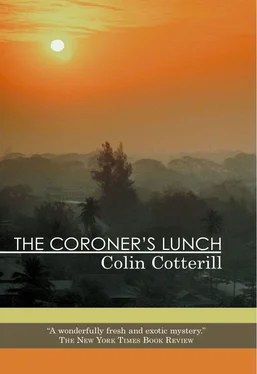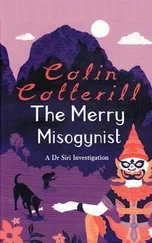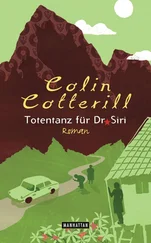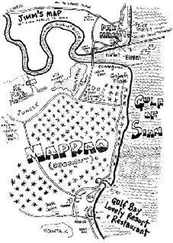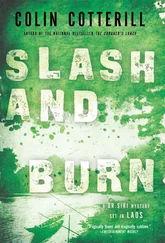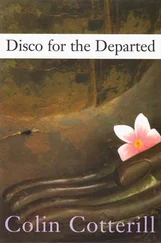Colin Cotterill - The Coroner's lunch
Здесь есть возможность читать онлайн «Colin Cotterill - The Coroner's lunch» весь текст электронной книги совершенно бесплатно (целиком полную версию без сокращений). В некоторых случаях можно слушать аудио, скачать через торрент в формате fb2 и присутствует краткое содержание. Жанр: Криминальный детектив, на английском языке. Описание произведения, (предисловие) а так же отзывы посетителей доступны на портале библиотеки ЛибКат.
- Название:The Coroner's lunch
- Автор:
- Жанр:
- Год:неизвестен
- ISBN:нет данных
- Рейтинг книги:3 / 5. Голосов: 1
-
Избранное:Добавить в избранное
- Отзывы:
-
Ваша оценка:
- 60
- 1
- 2
- 3
- 4
- 5
The Coroner's lunch: краткое содержание, описание и аннотация
Предлагаем к чтению аннотацию, описание, краткое содержание или предисловие (зависит от того, что написал сам автор книги «The Coroner's lunch»). Если вы не нашли необходимую информацию о книге — напишите в комментариях, мы постараемся отыскать её.
The Coroner's lunch — читать онлайн бесплатно полную книгу (весь текст) целиком
Ниже представлен текст книги, разбитый по страницам. Система сохранения места последней прочитанной страницы, позволяет с удобством читать онлайн бесплатно книгу «The Coroner's lunch», без необходимости каждый раз заново искать на чём Вы остановились. Поставьте закладку, и сможете в любой момент перейти на страницу, на которой закончили чтение.
Интервал:
Закладка:
“I doubt whether the Department of Information and Culture would be happy to see you reading such bourgeois perversions.”
She grinned at the doctor’s comment. “I’m just reminding myself how repulsive the capitalist system can be, Comrade.” She held up a badly registered three-color print of a television star wearing a miniskirt. “I mean, can you see me in something like that?”
Siri smiled to himself and raised his eyebrows. A rocking man in the corner of the office attracted his attention. “Ah, good morning, Mr. Geung.”
The rocking man smiled when he heard his name and looked up. “Good morning, Dr. Comrade. It’s…it’s going to be a hot one.” He nodded his agreement with his own comment.
“Yes, Mr. Geung. I believe you’re correct. Do we have any customers today?”
Geung laughed as he always did at Siri’s permanent joke. “No customers today, Dr. Comrade.”
This was it. This was the team he’d inherited, the job he didn’t want, the life he didn’t expect to be leading. For almost a year, he’d been the country’s head and only coroner. He was the first to confess to his lack of qualifications and his absence of enthusiasm for the job.
The first month of his on-the-job training had been ridiculous. The only Lao doctor with a background in performing autopsies had crossed the river, allegedly in a rubber inner tube, long before Siri’s arrival. So, apart from Mr. Geung, who had acquired a massive but well-concealed body of information as that doctor’s assistant, there was nobody to teach Siri how to do his new job.
So, once he’d agreed to postpone his retirement, he set about learning his trade from a couple of slightly charred French textbooks. He brought an old music stand from the abandoned American school and used it to hold the books open while he cut and sliced away at his first cases. With one eye on the music stand, he performed like a concert coroner playing away on the innards of the corpses. “Turn,” he would say, and Dtui turned the page. He worked through the numbers as recommended by French pathologists of 1948.
He’d performed a good deal of battlefield surgery over the years, but maintenance of the living was a very different science to the investigation of the departed. There were procedures that needed to be followed, observations that needed to be made. He hadn’t expected, at seventy-two, to be learning a new career. When he had arrived in Vientiane for the first time with the victorious Pathet Lao on November 23, 1975, there had been something far more pleasurable on his mind.
After the landmark party conference of December 5th, the mood had been higher than a rocket. The celebrations were awash in vat after vat of freshly made Lao rice spirits. Cheeks were bruised from manly kisses.
The crown prince, somber from suit to countenance, had read aloud his father’s notice of abdication and, naturally, declined an invitation to join the festivities. The Pathet Lao, after decades of cave-based insurgency, had become the rulers of Laos. The kingdom was now a republic. It was a dream many of the old soldiers, in their heart of hearts, had believed would never come true.
In the spirit of jungle fighters, they moved the trestle tables out of the banquet room and put down straw mats. There they sat in circles relishing their victory. Food and drink were replenished throughout the evening by pretty young cadres in thick lipstick and green uniforms.
Siri figured he’d probably spent more of his life cross-legged on the ground than he had in chairs. He, too, was in a buoyant mood that day, if not for the same reasons as his comrades. He would have returned to his guest house and slept the sleep of the victors if it hadn’t been for Senior Comrade Kham.
The tall, gaunt senior party member took advantage of a vacant spot in the circle beside Siri and sat himself down.
“So, Comrade Siri, we’ve actually done it.”
“So it would seem.” Siri was unused to rice whisky in such volume, and he wasn’t completely in control of his mouth or the tongue inside it. “But I have the feeling we’re here to celebrate the end of something rather than the beginning.”
“Marx tells us that all beginnings are difficult.”
“Nothing you or Marx have ever known could prepare you for the problems you’ve got coming. But, hell, Kham, you certainly shut the doubters up.” He raised his glass and chinked it against Kham’s, but quaffed alone. The comrade’s eyes were couched deep in their sockets, like snakes looking out at the world.
“You say ‘you’ as if you don’t plan to be helping us with our problems.”
Siri laughed. “Comrade Kham, I’m almost as old as the century. I’m tired. I think I’ve earned my small garden and my slow coffee mornings, afternoons of reading for pleasure, and early nights with a sweet cognac to ease me into sleep.” Kham raised his glass to the Prime Minister who sat red-faced and blissfully happy in a far circle. They both drained their glasses and called for another.
“That’s odd. As I recall, you don’t have any family living. How exactly were you planning to support this decadent lifestyle?”
“I assumed that forty-six years of membership of the party would entitle me….”
“To a pension?” Kham laughed rudely.
“Why not?”
Siri always believed, always assumed, that if ever the struggle was won, he would retire. It had been his dream on damp nights in the forests of the north. It was his prayer over the body of every young boy or girl he’d failed to pull back from death. He’d believed for so long that it would happen, he took it for granted that everyone else knew it too.
Kham continued to ridicule his plan. “My old friend, I would have expected you to know better after forty-six years. Socialism means contributing for as long as you still have something to give. When you start to forget where your mouth is and dribble egg down your shirt, when you need to pack towels into your underpants to keep yourself dry, that’s when the State will show its gratitude. Communism looks after its infirm.
“But look at you. You’re still in sparkling health. You have a sharp mind. ‘From each according to his abilities, to each according to his needs.’ How selfish it would be to deny your services to the country you’ve striven to free from tyranny.”
Siri looked across to the high circle. The President, a reformed member of the royal family, had a sweet, mascara’d soldier on either side of him and had begun to sing them a revolutionary Vietnamese song. He became the focus of attention and conversations hushed around the room. The song finished half way through the second verse when he forgot the words and the comrades erupted into cheers and applause. A small orchestra of bamboo and wood instruments started up on the stage and the conversations continued in a more dignified manner. Siri hadn’t yet been able to shed his disappointment. He waited for Kham to finish a heated conversation to his right and engaged him with more force than the man was used to.
“I take it my situation has already been discussed by the politburo.”
“It has. You’ve impressed us all with your quiet dedication over the years.”
“Quiet,” Siri took to mean “passive.” Over the past ten years, he’d ceased to display the revolutionary passion expected of him and had been shunted off to Party Guest House Number Three, away from all the policy-making and decision-taking in Sam Neua. There he tended to damaged cadres returning from the battlefields and lost touch with the zealous comrades and their politics.
Kham eased his haunches against Siri’s and put his arm around him. The doctor was himself a very tactile character but this gesture, in this situation, he considered disrespectful.
Читать дальшеИнтервал:
Закладка:
Похожие книги на «The Coroner's lunch»
Представляем Вашему вниманию похожие книги на «The Coroner's lunch» списком для выбора. Мы отобрали схожую по названию и смыслу литературу в надежде предоставить читателям больше вариантов отыскать новые, интересные, ещё непрочитанные произведения.
Обсуждение, отзывы о книге «The Coroner's lunch» и просто собственные мнения читателей. Оставьте ваши комментарии, напишите, что Вы думаете о произведении, его смысле или главных героях. Укажите что конкретно понравилось, а что нет, и почему Вы так считаете.
